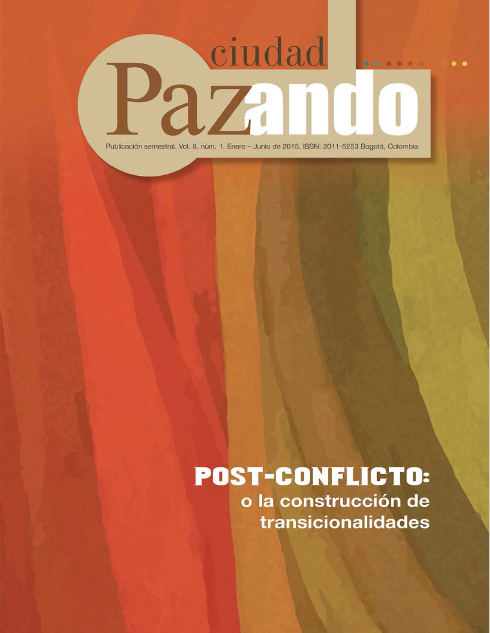DOI:
https://doi.org/10.14483/udistrital.jour.cpaz.2015.1.a08Published:
2015-10-16Issue:
Vol. 8 No. 1 (2015): Post-conflict: or building transitionalitiesSection:
Voces OtrasAproximaciones entre la enseñanza de la historia presente y las pedagogías de la memoria en el escenario educativo colombiano para la paz
Keywords:
memoria, enseñanza de la historia, pedagogías de la memoria (es).Downloads
Abstract (es)
Los ejercicios de memoria histórica adelantados en el escenario escolar sobre el conflicto armado colombiano hacen parte de los requerimientos establecidos en el Marco Jurídico para la Paz 2005-2014, que le asignó una serie de responsabilidades al sector educativo. En esta medida, se hace pertinente pensar conceptual y metodológicamente propuestas de pedagogías de la memoria que favorezcan el tratamiento del pasado reciente. Este trabajo expone, a través de una revisión bibliográfica y la adopción de la memoria como objeto historiográfico, algunos puntos de conexión entre la enseñanza de la historia del tiempo presente y las elaboraciones de memoria en espacios escolares y no-escolares.
How to Cite
APA
ACM
ACS
ABNT
Chicago
Harvard
IEEE
MLA
Turabian
Vancouver
Download Citation
License
The Ciudad Paz-ando Journal (RCP) is an open access publication, without economic charges for authors or readers, whose biannual publications are made under the terms of the Creative Commons Attribution - Non-commercial - Share the same License (CC-BY-NC -SA 2.5 CO), with which others may distribute, remix, retouch, and create from the work in a non-commercial way, as long as they give credit and license their new creations under the same conditions.
The copyright holder is Ciudad Paz-ando journal, retaining all rights without restrictions, respecting the terms of the license regarding the consultation, download and distribution of the material.
When the work or any of its elements are in the public domain according to the applicable current law, this situation will not be affected by the license.
Likewise, we encourage authors to deposit their contributions in other institutional and thematic repositories, with the certainty that culture and knowledge is a good for all and for all.

